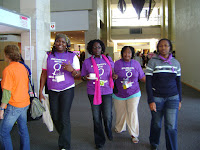



The AWID Forum has started today where a hundred of women's rights activitis, donors and other stake holders converged to discuss the power of movements.
It stared with the plenary which I was not able to attend fully forst because I hadnot picked my conference tag and package. Enever the less, Later I was given a temporary pass. Thank God I later got my conference tag and the package.
I was previledged to have attended the FTX training and thefore it gave me access to ftx hub which was fully equiped with computers and a space for interaction.
Break away session.
I met with my ED, my Immediate Boss and one of the Isis staff. We looked at the program and selected seesion we were going to attend
The ABC of Movement Building-What, Why, and How by Srilatha BThe presenter started by defining the term Movement as an organised set of constituents pursuing a common political agenda of change through collective action.
And some of the characteristics of movments
- Clear political agenda
- Strong leadership at mutliple levels. Usually Movments have strong leadership at the top level only
- Continunity
- Diversity stragegies of political struggle and sharp anlaysis of power structure
Characteristics of Feminist Movements
- Gendered political analysis and political goal which previlages women's interests and transforms both gender and social power relations
- Use gender strategies and gender analysis
- Women make up a critical mass meaning that they hold key decison making positions
Elements of Effective Feminist Movments
- Organisng and building mass base
- Consciuos raising and awreness building
- Focus on formal and substansive change- paradim shift in norms
- Clear power analysis to develop agenda
- Changing practice of power internaly and externally bearing in mind that most of us come from oppresive power backgrounds
Do Movements Matter Yes, they do matter alot. Women who have organised them selves into a critical mass have caused enormous chnage. Examples were drawn from India and Mexico where women were able to organised them in a movement and challenged policies and practices that were not favouring them
Below are the spheres both Informal and Formal that justify why Women's Movements Matter
INFORMALIndividual/ Community- Internalised attittudes
- Values
- Practices
- Cultural norms
- Beliefs
FORMAL
- Access to and control over resources
- Laws and Polices
Feminst/Women's movements have failed in some cases and countries because of several factors, one of them e being that our problems have been externally defined and do not address the critical areas. An example of HIV/AIDS case was given where HIV is given a femine case and its women who have the highest number of infection. Money has been given to address the HIV/AIDS epidermic and because it is externally defined to buy retroviral drugs and others, critical gender analysis of the disease and how it affects women and men differently has not been addressed.
After all has been disscused regarding feminist/ women movement, dow er have a feminist movement in Uganda.? and if it is there what major changes has in done.
Politics, Power and InternetToday, the intenet is shaping our existance in the transnational boundries. Women's rights have been emeshed in patriachal and capitalist values in the digital spaces.
When you introduce technology is the already inequality, it increases the inequality.
Can we think of a right to internet and communication rights in the digital spaces?
Can we have user generated content that women themselves can create?
An example of a google search about women in Costa Rich brought "Beautiful women from Costa Rica.
There is technical disaprootions. The internet today is shaping our reality world and creating visibility.
Women need to harness the potential of web2.o to create ther content















